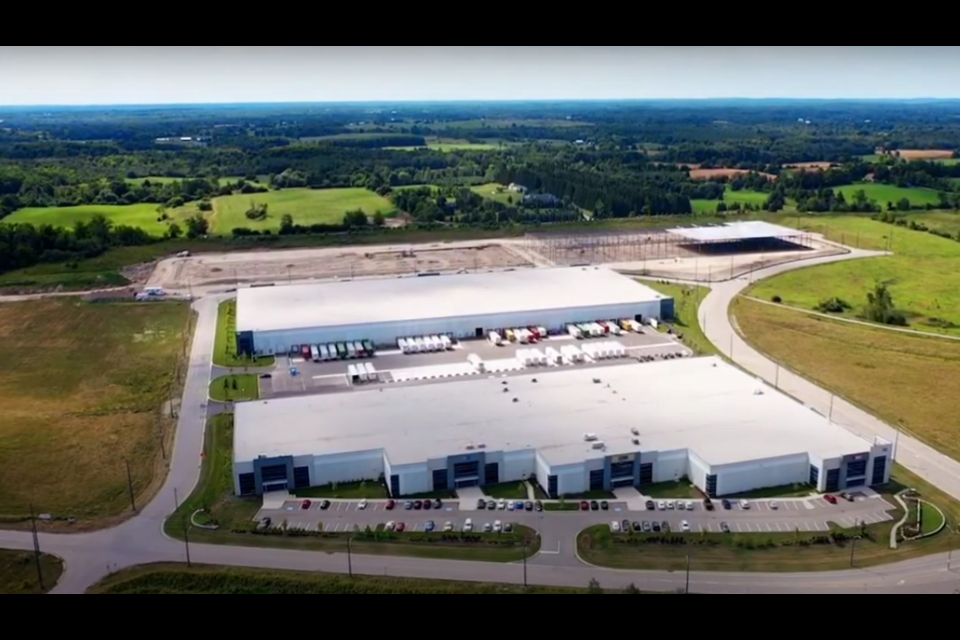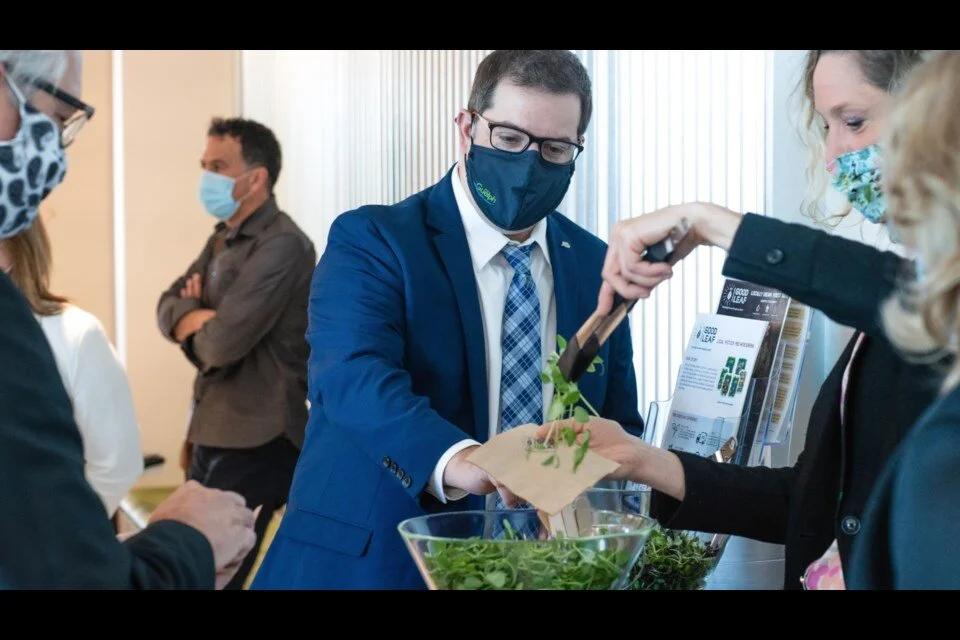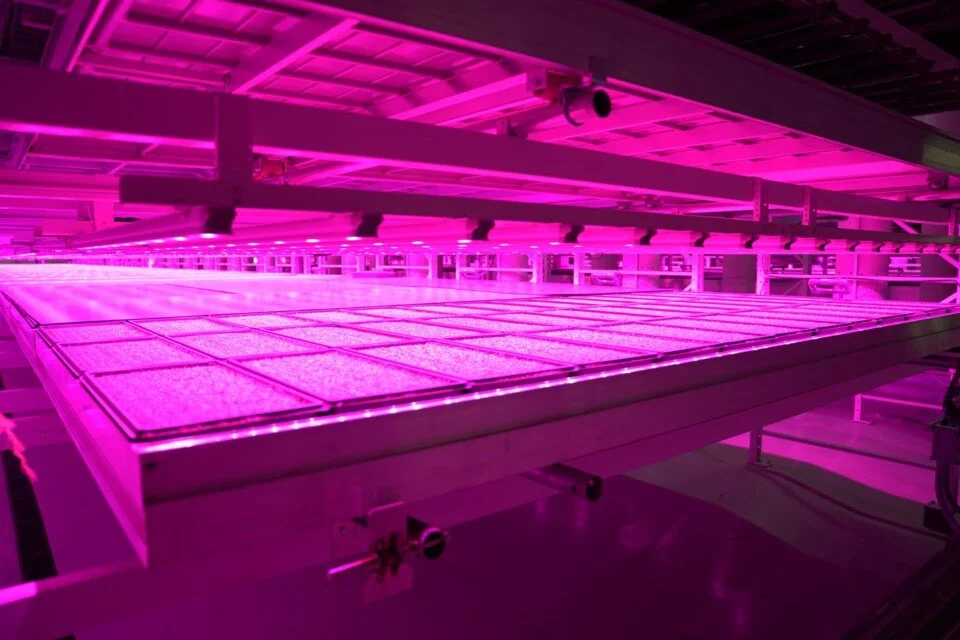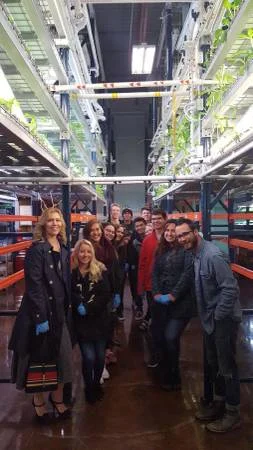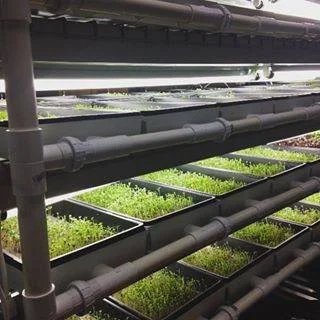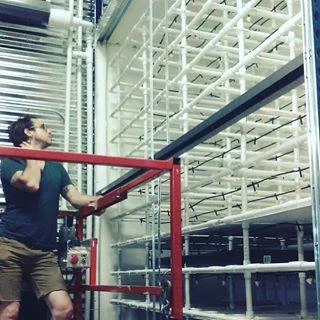
Welcome to iGrow News, Your Source for the World of Indoor Vertical Farming
Running A For-Profit Business With A Not-For-Profit Mission
Vertical Harvest is using controlled environment agriculture to give people with disabilities the opportunity to improve their livelihoods along with the sustainability and economies of their communities
Vertical Harvest is using controlled environment agriculture to give people with disabilities the opportunity to improve their livelihoods along with the sustainability and economies of their communities.
Jackson, Wyo., might not be the first place you think of when it comes to innovation in controlled environment agriculture. Vertical Harvest, which began operating in 2016, produces leafy greens, tomatoes, and microgreens in a 13,500-square-foot vertical greenhouse.
“From the beginning, Vertical Harvest set out to create a model that could leverage the greatest impact in communities,” said Nona Yehia, co-founder and CEO. “We are a model that is setting forth to cultivate healthy people, communities, and economies. It is through that understanding that all those things are linked to create sustainable communities. We know that successful communities are sustainable communities.”
Yehia said Vertical Harvest was born out of two critical needs in her community.
Nona Yehia, co-founder and CEO at Vertical Harvest, said her company is a model that aims
to cultivate healthy people, communities, and economies. Photos courtesy of Vertical Harvest
“Number one was that we import the vast majority of food that we eat,” she said. “By the time it arrives, it’s not that great to eat. Number two is that Jackson is a burgeoning local community, but it has never been a place that has been known to build careers. People come here to ski and party and then they leave. Business owners were having a really hard time keeping consistent employees, making it really hard to run a business.”
Creating a diverse, inclusive, and profitable workplace
One of the things most unique and innovative about Vertical Harvest is the workforce it employs.
“What was really important to me and to company co-founder Caroline Croft Estay was that Vertical Harvest would provide a place where underemployed populations could feel that they were contributing in a profitable environment,” Yehia said. “By employing people with physical and intellectual disabilities we were exposing peoples’ abilities rather than focusing on their disabilities. We were creating an employment bank that was actually beneficial to the bottom line. This was a big part of why we wanted to be a for-profit organization as well.”
From the beginning, Vertical Harvest was set up as a L3C or a benefit corporate model.
By employing people with physical and intellectual disabilities, Vertical Harvest has developed a workforce that is beneficial to the company’s bottom line.
“We wanted Vertical Harvest to be a scalable, replicable model that doesn’t have to be supported by a charitable or philanthropic organization,” Yehia said. “We wanted it to be a model that could be a part of the civic infrastructure and could perpetuate its own growth. The scalability and replicability of Vertical Harvest was why we chose the L3C model.”
Croft Estay was an employment facilitator trying to find consistent, meaningful work for her clients with physical and intellectual disabilities.
“These were people who grew up in the community, who wanted to contribute to their community and wanted to find consistent meaningful work,” Yehia said. “This is where we put food and jobs together in this vertical capacity. From the beginning, we were targeting a common problem that businesses undergo in our community.
“Right from the outset, other business owners were saying they were having this problem and they saw that Vertical Harvest was not. They asked us to help them. There is not only support for the individuals with disabilities, but there is support for the whole employee team to create a diverse inclusive workplace. The most valuable thing that we have built out of this commitment is our culture. We all know that businesses live or die on the quality of the culture that they have built. It is one of the most amazing things that we have built through this commitment to diversity and inclusion.”
Vertical Harvest, which initially built a 13,500-square-foot vertical greenhouse (shown) to
produce leafy greens, tomatoes and microgreens, is planning to expand with a 50,000-square-
foot prototype.
Developing a premium brand
Arik Griffin, who is Vertical Harvest’s chief financial officer, said one of the things the company has discovered is that part of the power of Vertical Harvest’s brand is the humanitarian good it is doing.
“People want to support us and buy our products,” Griffin said. “The restaurants and grocery stores like us for our quality and for the humanitarian message that they can get behind as do the consumers in the market place. People love our quality and they love our message. That translates into a brand premium.”
Yehia said it also helps that more people want to know where their food is coming from.
“Everybody has someone they know or a family who has a disability and the struggles that person goes through,” she said. “The reason that I am so passionate about this project is because I have a brother with a disability. At a very young age I realized he wasn’t going to have the same opportunities that I was going to have to create a career. That really resonates with people.
Vertical Harvest has expanded its customer base for its leafy greens, tomatoes and microgreens from Wyoming to include Montana and Idaho.
“We are creating opportunities and we have created an employment model where we bring out the abilities and it changes perceptions of what people are able to do. That creates a foundation of trust and strength with the community that really resonates with people, especially right now. It is what businesses can do. There is a real reward in benefitting people outside of your own stakeholder groups. This is something that is going to become more attractive as we move into 2021 and beyond.”
Unlimited expansion
Yehia has no doubt that the model Vertical Harvest has created can be profitable.
“Our incubator farm in Jackson will achieve profitability next year,” she said. “Vertical Harvest’s position in the industry is unique. There are a lot of these farms that have not succeeded. We have created a group of stakeholders who are committed to seeing Vertical Harvest and its prototype achieve profitability.
“Our two biggest hurdles that we learned are the production facility was too small to start out with and our market is too small. Jackson is a seasonal market. It is a smaller market than what our production system can produce in order to be profitable. We’ve expanded our customer base to include Montana and Idaho.
Arik Griffin, chief financial officer at Vertical Harvest, said part of the power of the company’s brand is the humanitarian good it is doing, which has been supported by its customers and consumers.
“We have worked very hard to understand the right crop mix, the correct market size, and the correct farm size that can create a return that would be attractive to social impact investors. We have created a 50,000-square-foot prototype that when placed in the right markets will succeed and that will occur quickly. We knew that we could take what we’ve learned from our successes as well as our failures to create this model that fits within the objectives of social impact finance.”
Vertical Harvest is looking at building five new greenhouses in the next five years. Its next project will be built in Westbrook, Maine, in 2021 with crop production expected to begin the following year.
“We want to bring this model to every community that we possibly can within the country and internationally,” Griffin said. “We have as our mission providing good food and good jobs to local communities. Another piece of our mission is to spread that out, to bring it to as many people as possible. We’re in the first stage of our Series A capital raise. We are raising funds in order to provide the infrastructure at the corporate level so that we can expand.
“The other thing we need to achieve this is hearing from communities and finding local stakeholders who want to do impact investing and make a difference in their communities. Bringing together the people who want to make a difference. We also need to make sure we are constantly in touch with experts in the CEA industry trying to nurture our relationships with the very best people.”
For more:
Vertical Harvest, (307) 201 4452; info@verticalharvestfarms.com; https://verticalharvestfarms.com/
This article is the property of Urban Ag News and was written by David Kuack, a freelance technical writer in Fort Worth, Texas.
CANADA: Bringing Local Greens To Ontario Year Round
The state-of-the-art farm is fully automated and equipped to grow microgreens and baby greens 365 days a year, without the use of pesticides, herbicides or fungicides and with dramatically less water consumption
NEWS PROVIDED BY
Sep 15, 2020
Vertical Farm In Guelph Is Now Fully Operational
GUELPH, ON, Sept. 15, 2020,/CNW/ - The revolutionary GoodLeaf Farms' 4,000-square-metre indoor vertical farm is now fully operational.
The state-of-the-art farm is fully automated and equipped to grow microgreens and baby greens 365 days a year, without the use of pesticides, herbicides, or fungicides and with dramatically less water consumption. The result is a safer, more nutrient-dense, and sustainably grown food source, providing a domestic alternative in a produce aisle highly dominated by imports from the southern United States or Mexico.
"Knowing where their food comes from is important to Canadians," says Jacquie Needham, Accounts Manager for GoodLeaf Farms. "Our growing system mimics the spring sun without the use of chemicals, releasing farming from the restrictions of the changing seasons. We can grow local, fresh, nutritious, and healthy leafy greens for the Ontario produce market all year long — we do it safely."
Vertical farming is an innovative growing process that naturally grows plants with hydroponics under specialized LEDs that concentrates the waves from the light spectrum that plants need to maximize photosynthesis. This method of farming is cost-effective, uniquely suited for Canadian climate, and scalable. GoodLeaf Farms is a leader in food safety. Every crop is tested for contaminants before it is shipped, ensuring it is safe for consumers.
GoodLeaf Farms is also sustainable. It uses 95 percent less water than a traditional farm, has no run-off issues or potential contamination of nearby water sources, it is local which eliminates thousands of kilometers of transportation from the supply chain and more food can be grown per acre, reducing land-use pressures.
GoodLeaf currently has four microgreens and two baby greens available in Ontario:
Spicy Mustard Medley — Blend of Asian greens create a spicy touch reminiscent of Wasabi or Dijon Mustard. It makes for a perfect peppery finish.
Pea Shoots — Sweet and crisp with a subtle pea flavour, they add a fresh bite to salads, seafood, and summer rolls.
Micro Asian Blend — Mild peppery flavour with a hint of mustard, this makes a great addition to stir fry, soups, or as a crunchy culinary adventure to any dish.
Micro Arugula — Intense spicy flavour that is both peppery and nutty. Use this to elevate the look and flavour of any meat or seafood dish, as an addition to your salad or to garnish your sandwich.
Baby Kale — Earthy and nutty, it is a calcium-rich dark green to add a nutritional punch to any salad.
Baby Arugula — Excite your taste buds by adding this spicy and peppery green to your salad or as a topping for sandwiches or burgers.
"The pandemic has underscored how important it is to have access to local food sources – food that we know is safe, grown responsibly, and immune to border closures," says Ms. Needham. "Compared to a green that was grown thousands of miles away, packed onto a hot truck and shipped across the continent, our process is far superior. Local food is simply better — better for you, better for the environment and better for our economy."
Follow GoodLeaf Farms on Instagram at @goodleaffarms and like it on Facebook at /GoodLeafFarms.
About GoodLeaf Farms:
With a passion for delicious, nutrient-rich greens, GoodLeaf was founded in Halifax in 2011. Using an innovative technology and leveraging multi-level vertical farming, GoodLeaf has created a controlled and efficient indoor farm that can grow fresh produce anywhere in the world, 365 days of the year. The system combines innovations in LED lighting with leading-edge hydroponic techniques to produce sustainable, safe, pesticide-free, nutrient-dense leafy greens. GoodLeaf has ongoing R&D Programs in collaboration with the University of Guelph, Dalhousie University, and Acadia University.
Learn more at goodleaffarms.com.
SOURCE GoodLeaf Farms
For further information: Jacquie Needham, Accounts Manager at GoodLeaf Farms, jneedham@goodleaffarms.com, 416-579-6117
US: West Chicago - FOR SALE or RENT: Turn Key Vertical Hydroponic Indoor Urban Farm
The farm and its brand has been successful for over 4 years, the owner is moving on and has taken a managerial position with a large Indoor Vertical Farming company
This is an Indoor Urban Vertical Hydroponic Farm that was built and engineered in 2015
The farm and its brand has been successful for over 4 years, the owner is moving on and has taken a managerial position with a large Indoor Vertical Farming company.
This is an extremely functional hydroponic vertical farm. 1800 Sq ft with 18 foot ceilings.
This facility is able to produce 8 acres worth of food in just 4% of 1 acre (That’s 200x).
The present owner has grown 70+ varieties of microgreens, countless greens, herbs, and edible flowers, and small vining fruits.
The facility was built in collaboration with the DuPage County Public Health Department, and has been certified by the USDA and Third Party Certifiers like Primus, etc.
Everything in the space is food grade, and the facilities walls were built with the finest grade vapor/ particulate barriers inside the walls.
The lights are 60% fluorescent and 40% LED.
You will have access to all lights, but I would encourage you to invest in more LEDS.
This is a turn key facility ready to operate efficiently and at full capacity.
Greens / Herbs / Edible Flowers
33 shelves - 8’x3.5’
6 8’ NFT channels per shelf - 10 plant sites per channel
198 Total NFT Rails with 1,980 plant sites
1980 sites divided by 4 week grow > 495 grow sites/week X $2.5 = $1237/week
*NFT Channels are by Farmtek - size: 4”x2”x8’
Microgreens
27 shelves - 8’x 3.5’
8 Microgreen Specific NFT Channels - 2 10”x 20” trays per channel
432 Total spaces for 10”x 20” flats
432 flats X $13/4oz(very conservative) = $5616/week
*Cropking NFT channels specifically for 10 x 20 flats
Vining Fruits / Herbs
15 shelves - 8’x 3.5’
6 - 3.5’ NFT Channels per shelf - 3 sites per channel
90 - Total NFT Channels with 270 plant sites
Depending on what you grow $1000-3000/week
Also features:
Germination Chamber
Custom built to be an automated baker’s rack style setup to germinate microgreens, lettuces, and herbs in 10”x 20” flats. Capability of holding 144 10x20 trays. 4 sliding doors make it easy to open and close.
All materials are food grade safe and USDA/third party compliant.
Misters run on a very user friendly IPAD app that can be programmed down to the minute.
Separate Harvest Room
2 food grade tables and 3 food grade stainless steel shelves can hold your packaging and accompany 2-3 harvesters. There is a small walk in cooler in the room - 5’x5’x 6’ Tall.
There is also a small hand washing sink.
5 - Reservoirs
3 - 200 gal, 2 500 gallon
1 - 500 gal for microgreen system
1 - 500 gal for greens/herbs/edible flowers system
2 - 200 gal for vining fruits - grow / fruit cycles
1 - 200 gal for cleaning
The system is plumbed so that there are 5 water lines (one for each reservoir) that run parallel, and the cleaning water (generally bleach, etc) can be run through the system while the rest of the shelves are still running their proper water solutions.
For each reservoir there is a powerful pump that goes to the system, but also a seperate pump with separate water lines that go through a filter, then a water chiller, then through a dosing system, then back in the reservoir. So the water is constantly being purified and regulated for the system.
There are also Air pumps and lines for each reservoir.
*The current dosing systems are slowly but surely breaking down - I would strongly recommend purchasing new dosing systems for each reservoir you plan on operating.
3 - 48” x 48” Nurseries on one reservoir
Seeding Station with food grade shelves and stainless steel tables
3 - compartment sink
2 - 4’ x 4’ ventilation fans that sync up with 3 large evaporative cooling walls to ventilate and cool the space by 10-15 degrees F. This system is ran by an Autopilot Digital Environmental Controller.
354 Total Light fixtures capable of accepting 2 48” flourescent or LED bulbs
Plenty of Storage
Room to double the Greens/Herbs/Edible Flowers/Microgreens section
Employee Fridge and File cabinets (2 large, 1 small)
Rolling Stairs
Monthly Rent: $1250 - The space, Utilities (electric, water), Use of a scissor lift.
Sale Price: $115,000
Rental Price:
$3,200 Rent: All Equipment
$4,450 Total Monthly Rent
All information is from sources deemed reliable but is subject to errors, omissions, changes in price, prior sale or withdrawal without notice.
No representation is made as to the accuracy of any description.
All measurements, yields and square footages are approximate and all information should be confirmed by the customer.
Disclaimer of Warranty - The 2016 Freight Farms LGM hydroponic farming container is being sold “as is” and the Seller disclaims all warranties of quality, whether express or implied, including the warranties of merchantability and fitness for a particular purpose.







